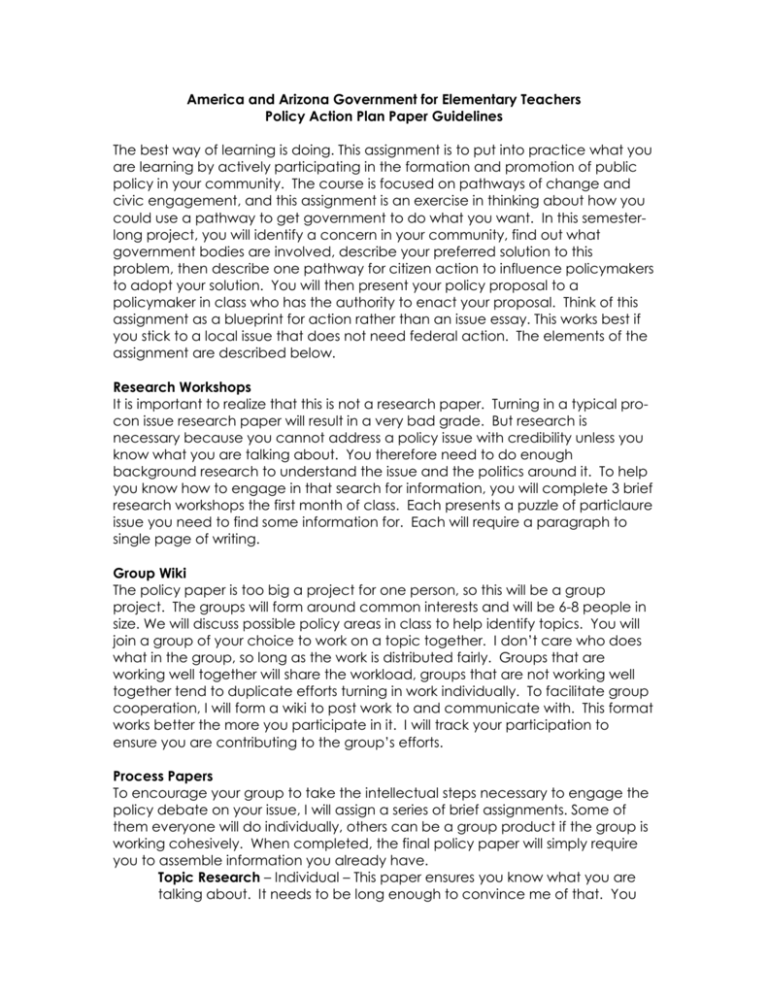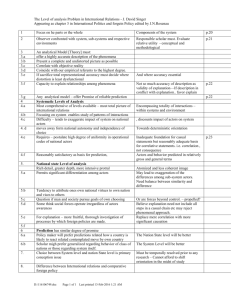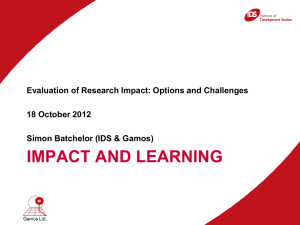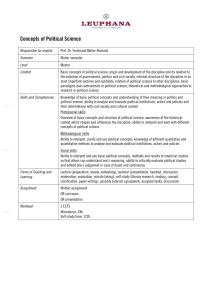Policy Action Plan Paper - Arizona Geographic Alliance
advertisement

America and Arizona Government for Elementary Teachers Policy Action Plan Paper Guidelines The best way of learning is doing. This assignment is to put into practice what you are learning by actively participating in the formation and promotion of public policy in your community. The course is focused on pathways of change and civic engagement, and this assignment is an exercise in thinking about how you could use a pathway to get government to do what you want. In this semesterlong project, you will identify a concern in your community, find out what government bodies are involved, describe your preferred solution to this problem, then describe one pathway for citizen action to influence policymakers to adopt your solution. You will then present your policy proposal to a policymaker in class who has the authority to enact your proposal. Think of this assignment as a blueprint for action rather than an issue essay. This works best if you stick to a local issue that does not need federal action. The elements of the assignment are described below. Research Workshops It is important to realize that this is not a research paper. Turning in a typical procon issue research paper will result in a very bad grade. But research is necessary because you cannot address a policy issue with credibility unless you know what you are talking about. You therefore need to do enough background research to understand the issue and the politics around it. To help you know how to engage in that search for information, you will complete 3 brief research workshops the first month of class. Each presents a puzzle of particlaure issue you need to find some information for. Each will require a paragraph to single page of writing. Group Wiki The policy paper is too big a project for one person, so this will be a group project. The groups will form around common interests and will be 6-8 people in size. We will discuss possible policy areas in class to help identify topics. You will join a group of your choice to work on a topic together. I don’t care who does what in the group, so long as the work is distributed fairly. Groups that are working well together will share the workload, groups that are not working well together tend to duplicate efforts turning in work individually. To facilitate group cooperation, I will form a wiki to post work to and communicate with. This format works better the more you participate in it. I will track your participation to ensure you are contributing to the group’s efforts. Process Papers To encourage your group to take the intellectual steps necessary to engage the policy debate on your issue, I will assign a series of brief assignments. Some of them everyone will do individually, others can be a group product if the group is working cohesively. When completed, the final policy paper will simply require you to assemble information you already have. Topic Research – Individual – This paper ensures you know what you are talking about. It needs to be long enough to convince me of that. You should expect to write between 3 and 8 pages, depending on how good you are at being concise. A cohesive group will assign sub-sets of the topic to various members so that as a group you have a comprehensive view of the issue. This paper should follow the normal format expectations of college level work (typed; correct spelling, grammar, and paragraph structure; citations). Alternate Policies – Group – This paper explores the various options that are being discussed to address your issue. You will list 5 policy options. One option has to be defending the status quo, or doing nothing. You should write one paragraph for each policy option. Policy Pro/Con – Group – This paper provides a two paragraph defense of both sides of the policy option your group is selecting. This is an exercise in taking the other side seriously. As such, oversimplified or “straw man” arguments of the other side will not be accepted. You need to understand the opposite view before you can effectively counter it. Policy Process Outline – Group – This paper briefly outlines the politics of enacting your preferred policy. Who has the authority to make the decision you are asking for. What process do they follow to enact a decision? This should only be a couple of pages in length. You are required to provide contact information for the policy-makers you identify. There should be at least four people on that list. Please rank order them in order of impact on the decision or support for your position. I will be contacting these people to invite them to listen to your proposal at the end of the semester. Policy Action Plan Paper Your group will submit a written paper at the end of the semester. This paper has four parts: What is the issue and why is it important; What are the policy options being discussed to deal with that issue, and which option do you prefer; What is the policy process required to implement your preferred option; How could you use the political process to influence that process to achieve your preferred option. You will note that the first three parts will be in hand following the process assignments above. The last part is the most important though. This paper is an opportunity for your group to show me what you learned in this course about citizen engagement in the political process. Show me how you would make your action plan a reality. Class Presentation At the end of the semester, your group will present your action plan to a policymaker who has the authority to enact your plan. The presentation must include a visual aspect (PPT, video, or web) and must include a handout with summary data. A cohesive group will usually have one or two presenters, not several separate parts. This should be approached as a formal presentation, as you will be publicly representing MCC. You should also respect the individual and their time enough to dress properly and prepare professional materials. This interaction is the culmination of the assignment. Group Assessment Fifty points will be assigned to you by your peers based on your participation. This is where you rat out the free riders in your group. I don’t care who does what in your group as long as the end product looks great, but a cohesive group will divide the workload fairly. If you don’t return calls, don’t post content on the wiki, and don’t show up at the emergency meeting your group called the weekend before the paper was due, then don’t be surprised to lose many points on the group assessment. Alternatively, when you assign scores, be professional. The group assessment is not a place to get revenge for that guy who never asked you out, nor is it Christmas. Assign points that you feel were earned; no more, no less. Finding a Topic: You need to come up with a topic on your own for it to be meaningful. If I were to give you a topic, you would just be pursuing my agenda, and what's the fun in that? First select a local concern, then identify what options are being considered, then identify who the actors are who have decision-making authority. The paper itself will focus on how you would use the pathways of change to advocate your policy preference given the political realities you identify. As you drive around, or watch the news, or read the paper, or yak with your co-workers, what topic do you keep going back to? When do you end a thought with "there ought a be a law!"? Or, conversely, do you end a thought with "why is this a law?" Or, do you look at something and think "someone should fix that?" Let me give you an example from a previous semester. A student was walking across Southern north of MCC campus and almost got splattered by a car turning left. He and his classmates took turns sitting at the corner with a notepad and counted how many near-misses occurred at that intersection in one day. They then wrote up a proposal to change the way the lights work at that crossing. Then, since this was a regular semester, I invited the Mesa Transportation Board to my class and the students presented their proposal to the city employees who make such decisions. The board listened, agreed in essence with the students, and about 6 months later adjusted the lighting on the crosswalk to what they look like today. These students found a local, concrete, do-able topic. I don't want you to write on a generic, national level topic. Buying an opinion essay on gun control from the internet will result in a very bad grade, for example. What is something that affects you personally? Framing the issue and identifying actors: Once you identify a topic, the next step is to frame the issue more clearly. You do this by identifying the options under consideration by the policymakers who are in charge of this topic. What are they considering? What options are other groups asking them to consider? Is the option you prefer on the table yet? Is doing nothing a viable option? You need to know the real answers to these questions to avoid writing an academic-disconnected-from-reality paper on your topic. You can find the answers to these questions by doing a newspaper search, looking at the websites of the agency or city you are focusing on, and even calling and asking a staff person who works in that area. Contacting interest groups who are lobbying for change in the topic area will also produce a wealth of information. Don't make this part harder than it is, all you need to do is find out enough to be able to frame the topic by answering those questions. The next thing to do is to identify the actors involved in making this decision. You will need to identify them in your paper. Knowing who they are and what position they hold will also tell you what influence strategies will work best, which will enable you to write the most important part of the paper. The Politics of Change Once you have identified a topic, the varying policies to address that topic, your preference, and the actors involved in making that policy, the final, and most important step, is to decide how to use the political process you have learned about in this class to influence the policy makers to enact your policy preference. The paper you write is a description of all of these elements, in that order. This means I am not looking for a generic pro-con opinion essay on your topic. You need to include all of the elements listed above. The last part - how to influence the policy process - is the most important. The paper is brief enough that you should not get bogged down in a lengthy treatise on the history of your topic. Stick to the outline I have given above. Paper Rubric Describe Project: This should be about 25 to 50 percent of the content. Describe the issue and why it is important. Select Policy: What policy are you supporting? It is always a good idea to acknowledge alternate policies and briefly state why you reject them. ID Actors: What decision-making body has the authority to enact your favorite policy? Who are the key actors? Political Action: This is the most important part of the paper and should be at least 25 percent of the content. Given your policy and the actors, how would you use the political process to influence the actors to make the decision you want them to make? This is where you demonstrate what you have learned from the course. Use of Course Concepts: Dropping political science terms with the correct usage into your paper is also a good idea. Remember that all paper assignments in college are ways to demonstrate learning.





